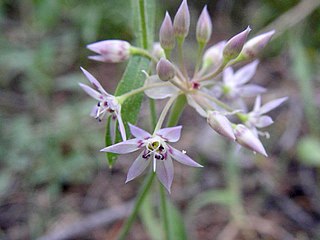
Allium validum is a species of flowering plant commonly called swamp onion, wild onion, Pacific onion, or Pacific mountain onion. It is native to the Cascade Range, to the Sierra Nevada, the Rocky Mountains, and other high-elevation regions in California, Oregon, Washington, Nevada, Idaho and British Columbia. It is a perennial herb and grows in swampy meadows at medium and high elevations.

Allium campanulatum is a species of wild onion known by the common name dusky onion or Sierra onion. This is a flowering plant native to the western United States from southeastern Washington and northern Oregon to southern California, and western Nevada. The dusky onion grows in foothills and mountains, especially in dry areas, such as chaparral habitats.

Allium nevadense is a species of wild onion known by the common name Nevada onion. It is native to the western United States where it grows in sand and rocky soil at elevations of 1400–1700 m. The species is widespread in Utah, Nevada and southern Idaho, and has been reported also from southeastern California, northwestern Arizona, western and central Colorado and eastern Oregon.

Allium obtusum is a species of wild onion known by the common name red Sierra onion or subalpine onion. It is native to eastern California and western Nevada. It is a common plant in the granite foothills and mountains of the Sierra Nevada and southern Cascade Range, from Tulare County to Siskiyou County, from elevations of 800 to 3,500 metres. In Nevada, it is reported only from Washoe County in the northwestern part of the state.

Allium platycaule is a species of wild onion known as broadstemmed onion or flat-stem onion. It is native to northeastern California, south-central Oregon and northwestern Nevada. It is found on slopes of elevations of 1500–2500 m.

Allium tuolumnense is a rare species of wild onion, known by the common name Rawhide Hill onion.

Allium abramsii is a species of wild onion known by the common name Abrams' onion.

Allium burlewii is a species of wild onion known by the common name Burlew's onion. It is endemic to California, where grows in the granitic soils of several of the central and southern mountain ranges from Riverside and San Bernardino to Fresno and Monterey Counties, usually between 6,000 and 10,000 feet above sea level.

Allium cratericola is a species of wild onion known by the common name Cascade onion. It is endemic to California, where is an uncommon member of the flora in several of the state's mountain ranges, including the northern and southern California Coast Ranges, the western Transverse Ranges, Klamath Mountains, and the Sierra Nevada foothills. Its range covers much of the state, from Riverside County to Siskiyou County.

Allium denticulatum is a species of wild onion known by the common name toothed wild onion. It is endemic to southern California, where it grows in the western Mojave Desert, the adjacent Tehachapi Mountains, the southern Sierra Nevada, and the Palomar Mountains. It is reported from Kern, San Bernardino, Riverside, Ventura, San Diego Counties.
Allium diabolense, common name serpentine onion or devil's onion is a species of wild onion endemic to central California, where it is known from the Coast Ranges and the Transverse Ranges. It grows on serpentine soils at elevations from 500 to 1500 m, from Kern and Ventura Counties north to Stanislaus and Santa Clara Counties.

Allium hickmanii is a rare species of wild onion known by the common name Hickman's onion. It is endemic to California, where it is known from Monterey, Sonoma, Kern, and San Luis Obispo Counties.
Allium hoffmanii is a species of wild onion known by the common name beegum onion. It is native to northern California, where it grows in the serpentine soils of the local mountain ranges in Siskiyou, Humboldt, Trinity, Shasta, and Tehama Counties.

Allium howellii is a North American species of wild onion known by the common name Howell's onion. It is endemic to California.

Allium membranaceum is an uncommon species of wild onion known by the common name papery onion. It is endemic to California, where it grows in wooded areas in the southernmost Cascade Range, the northern Coast Ranges, and the Sierra Nevada foothills from Tulare County to Humboldt County. It is found on wooded slopes at elevations of 200–1400 m.

Allium parishii is an uncommon species of wild onion known by the common name Parish's onion. It is native to the Mojave Desert and Sonoran Deserts of California and Arizona. It grows on open dry, rocky slopes at elevations of 900–1,400 m (3,000–4,600 ft).
Allium parryi is a North American species of wild onion known by the common names Parry's onion and Parry's fringed onion. It is common in the Coast Ranges of southern California and northern Baja California. It is also known from the southernmost reaches of the Sierra Nevada.

Allium praecox is a species of wild onion known by the common name early onion.
Allium punctum is a species of wild onion known by the common name dotted onion or Modoc onion. It is native to the western United States in and around the Modoc Plateau in northeastern California, northwestern Nevada, and southeastern Oregon. It is uncommon, growing in volcanic flatlands created by old lava flows.

Allium bisceptrum, also known as the twincrest onion or aspen onion, is a high elevation plant native to western United States. It is a perennial that thrives under damp and shady conditions or open meadows in California, Arizona, New Mexico, Nevada, Oregon, Washington, Idaho, and Utah.

















